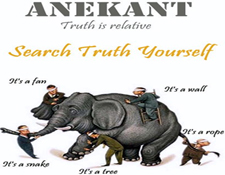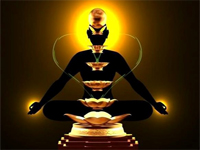Circumstances are not everything. To put all the blame on it is not fair. Circumstances can be changed and they will change, but what happens to the emotional system within? How can that be changed?
Bhagvan Mahavir was asked, "Noble teacher! Some people say one cannot meditate in the village. It can be done only in the forest, in loneliness. Is the place of meditational practice, binding?"
Mahavir said, "Child, Meditational practice can be done anywhere in the village as well as the forest. And yet it cannot be done anywhere either in the village or in the forest."

This is the anekanta perspective of meditation. One Acharya wove the same sutra or lesson into this language:
Ragdweshu vinirjitya kimrannye karishyasi? Ragdweshu anirjitya kimarannye karishyasi? If you have conquered passions, then what will you do going to the forest? If you have not conquered passions then what will you do going to the forest?
The basic lesson is that we should reflect on all problems from the viewpoint of anekanta. Whether the problem is a practical one or a spiritual one, a social one or a political one, they can all be solved with anekanta. With uni-dimensional perspectives, problems become more complicated, more entangled. Man falls into a stupor. He begins to think, "I am not the creator of the problems. I am only trying to save myself from them. The problems are created by some one else." This kind of illusion envelops him.
The husband told the wife, "I can hear somebody calling from downstairs. I think my friend is calling me. You go down and tell him I am not home". The wife replied, "You never tell lies, but today I have lost that respect for you." To this the husband replied, "Oh no! I really do not tell lies. That is why I am telling you to tell them" Where the perspective is only from one angle and the entire picture is not apparent them man gets into trouble. He is not sure what he is doing. He gets entangled in his own language.
We should try and understand the principle of anekanta. Anekanta is the third eye. It is even larger than the eye that rests between the two eyebrows. Till this eye does not begin to function, the principle of anekanta cannot be awakened and nothing can be seen as right. Our actions and thoughts will not be right.
There are three views: right view (samyak drishti), wrong view (mithya drishti) and right-wrong view (samyak-mithya drishti). Both wrong view and right-wrong view influence us. We cannot grasp truth through these two. Only when we move away from these two views and adopt right views does the consciousness of anekanta blossom within us. Even this has a biological reason. The hypothalamus in our brain has two special hormones. One is called melatonin and the other seratonin. These chemicals influence our character. They influence our perspective.
According to karma sastra, mohaniya karma influences our consciousness, numbs it. If the atoms of numbness were not there then our mind would never get distorted. Our conscious is infinite and limitless. It does not have the limits of time and space. The secretion of melatonin creates distortions in our character. It is responsible for sexual passions, anger and fear. The other chemical, seratonin also influences us greatly. It influences our perspective. Its main activity is to inhibit the conscious brain. It swarms the brain covering the consciousness.
L.S.D. is much discussed today. It is improbable to think that the present-day citizen, the one who studies in the university will not know its name and use.
In some university campuses, sadhana kendras or institutions where meditation and yoga are being taught, L.S.D. is also being used extensively. This is because after using it just once, man begins to have hallucinations and go through varied kinds of experiences. He thinks he has actually been transported to heaven and other such new worlds. Then he begins to think L.S.D. is a gift of god. L.S.D. contains seratonin. Our brain too has seratonin. It affects our brain in great measure. It distorts our very outlook. It becomes a false outlook. Seratonin influences the entire conduct, which becomes full of distortions.
The effort of meditation is to change these secretions. When we contemplete on the center of peace (shaktikendra), the center of enlightenment (jyotikendra) and the center of intuition (darshankendra), our hypothalamus is influenced. This in turn influences the pineal and the pituitary glands. When these psychic centers are influenced, the secretions change.
In the method of Preksha Dhyan, the meditation on the psychic centers is very significant. It is significant because without this a man cannot be transformed.

We may meditate on the breath or on the body or even on colours, but the truth is that unless we get to the root of it, that is, unless the psychic centers are influenced, the secretions cannot be changed and a man's behavioural pattern cannot be altered, his habits cannot be altered and his nature cannot be altered. Without energizing the psychic centers, the conscious mind cannot be awakened, numbness cannot be avoided and perspectives cannot be changed. We can say that till then the perspective does not have right base.
From the perspective of substance, the third eye is permanence, eternal. We see origination and destruction with our two eyes. Till we are not able to see the permanent, we will not have developed the capability to see the eternal. Our third eye cannot be opened. From the perspective of substance, the third eye is the ability to see permanence.
 Acharya Mahaprajna
Acharya Mahaprajna